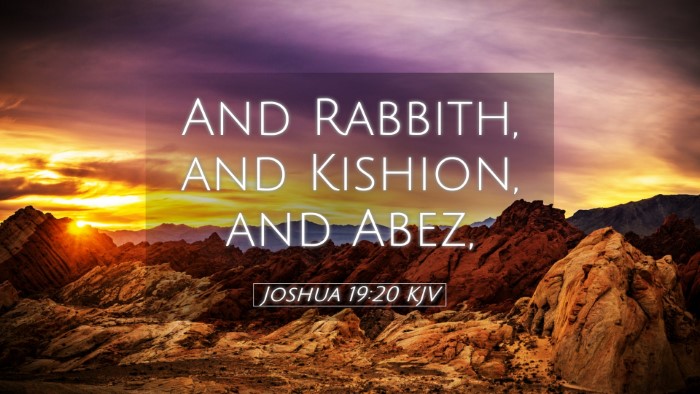Commentary on Joshua 19:20
Joshua 19:20 reads, "And the rest of the children of Ephraim by their families were the tribe of Ephraim according to their families." This verse concludes the allocation of land to the tribe of Ephraim in the division of Canaan, a significant moment in the history of Israel.
Overview of the Context
To appreciate the significance of Joshua 19:20, it is essential to contextualize it within the wider narrative of the Book of Joshua. This book details the conquest of the Promised Land and the subsequent distribution of territory among the tribes of Israel. Exploring the historical implications and theological insights, we see several layers of meaning pertinent to God’s promises and the fulfillment of His word.
Theological Insights
In the allocation of land, we see the sovereignty of God in fulfilling His promises. Throughout the Torah, particularly in Genesis and Exodus, there is a clear promise of land made to Abraham, Isaac, and Jacob. The division of the land to the tribes of Israel is a fulfillment of this divine promise.
Matthew Henry's Perspective
Matthew Henry emphasizes the importance of familial and tribal identity in Israel's history. He points out that the distribution among families within the tribe shows God's attention to the details of His covenant promises. The allocation was not merely administrative; it represented God's faithfulness to each lineage. Henry states:
"The land was divided to the tribes according to their families, ensuring that the promises of God extend beyond mere geographical bounds to relational and covenantal significance."
Albert Barnes' Commentary
Albert Barnes highlights the political and social implications of this land distribution. He notes that each tribe's geographical boundaries were critical for the establishment of Israel as a nation. In discussing this verse, Barnes notes:
"The delineation of boundaries was essential for maintaining order and unity within the nation. The separation and definition of family territories would foster a sense of community and indenture each tribe into the larger narrative of Israel's identity."
Barnes further reflects on the symbolic meaning of ownership and stewardship, stressing that land possession was a reflection of God's presence with His people.
Insights from Adam Clarke
Adam Clarke provides additional depth by analyzing the language used in this verse. He suggests that the phrase "the rest of the children" implies a recognition of the unity and continuity of the tribe of Ephraim. Clarke comments:
"This designation unites both the past and present generations, indicating that the blessings and responsibilities of the covenant continue through familial lines."
Clarke emphasizes that this passage highlights the importance of spiritual inheritance, which extends beyond mere possession of physical land but encompasses the legacy of faith transmitted through generations.
Implications for Modern Readers
For pastors, students, and theologians, Joshua 19:20 serves as a reminder of the significance of heritage, community, and divine promise. It invites reflection on how we view our own spiritual inheritance and responsibilities within God's covenant community.
Spiritual Lessons
- Understanding Our Heritage: Just as the tribes were aware of their lineage, modern believers should recognize their spiritual heritage and identity in Christ.
- Covenantal Responsibility: Each believer is called to be a steward of their faith, passing on the promises of God to subsequent generations.
- Unity in Diversity: The division of land among families teaches us about the beauty of diversity within the unity of the body of Christ.
Practical Applications for Today’s Church
The content of this verse can be applied in various ways within church life:
- Fostering Community: Churches should focus on building communities that honor familial and communal ties, ensuring that every member feels valued and has a role.
- Teaching on Stewardship: The faith community should engage its members on the concept of stewardship – not just in finances, but in talents, time, and spiritual gifts.
- Encouraging Legacy: Programs that encourage mentorship and cross-generational relationships can help cultivate a deeper understanding of faith as a living legacy.
Conclusion
Joshua 19:20 is more than a historical record; it is a rich tapestry woven with theological, practical, and spiritual threads. As we contemplate the land allocation for Ephraim, we are invited to consider our own place within the unfolding narrative of God's covenant promises. Through contributions from Matthew Henry, Albert Barnes, and Adam Clarke, the challenges and inspirations remain relevant for our faith communities today.


